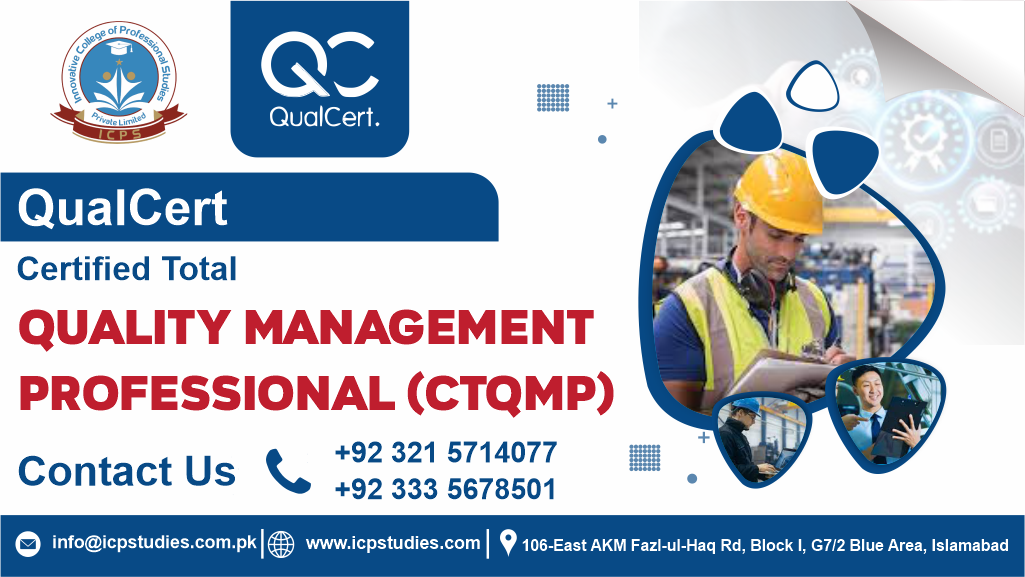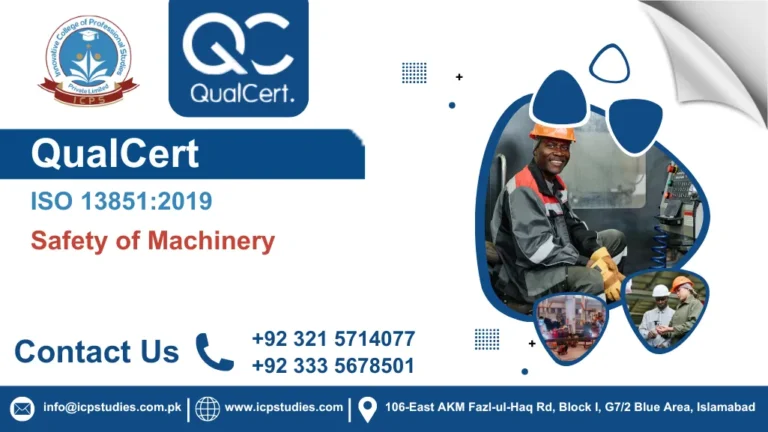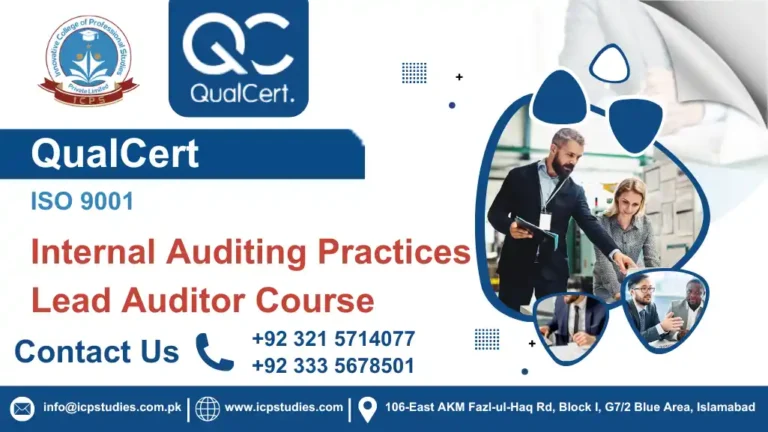In today’s highly competitive market, ensuring consistent product quality and superior customer service is key to long-term business success. To achieve this, organizations must adopt effective quality management practices and nurture a workforce with expertise in quality principles. The Certified Total Quality Management Professional (CTQMP) certification equips professionals with the skills and knowledge needed to drive quality improvements and achieve operational excellence.
The Certified Total Quality Management Professional (CTQMP) course offers a comprehensive framework for understanding and implementing Total Quality Management (TQM) in any organization. TQM is an approach that seeks to continuously improve the quality of products, services, and processes across an organization by focusing on customer satisfaction, employee involvement, and data-driven decision-making. This certification provides professionals with the expertise needed to foster a culture of continuous improvement, meet international quality standards, and deliver consistent results that satisfy customer expectations.
The Certified Total Quality Management Professional (CTQMP) certification is an invaluable asset for professionals looking to enhance their ability to drive quality initiatives, optimize processes, and deliver superior customer value. By gaining expertise in Total Quality Management, you’ll be equipped to contribute to organizational growth, improve performance, and achieve lasting success.
Enroll today to begin your journey towards becoming a certified Total Quality Management Professional!
All About Certified Total Quality Management Professional (CTQMP)
Course Overview
In today’s highly competitive and rapidly evolving business landscape, maintaining consistent product quality and exceeding customer expectations are critical to long-term success. Total Quality Management (TQM) provides the blueprint for organizations to achieve these goals by embedding quality into every aspect of their operations.
The Certified Total Quality Management Professional (CTQMP) course is designed to equip professionals with the knowledge and practical skills required to drive quality improvement initiatives and optimize business processes. This comprehensive certification program focuses on core TQM principles, tools, and methodologies to foster a culture of continuous improvement across organizations.
Participants will learn how to implement quality management systems that enhance efficiency, reduce waste, and improve customer satisfaction. The course covers vital areas including quality planning, process improvement, employee engagement, leadership in quality management, and supplier relationships. Whether you’re aiming to enhance your career or lead successful quality-driven projects, the CTQMP certification will prepare you to make a significant impact in any organization.
By completing the CTQMP course, you will be empowered to implement quality strategies, utilize key tools for process optimization, and lead teams toward excellence, ensuring that quality becomes a key driver of organizational success.
Study Units
- Introduction to Total Quality Management (TQM)
- Quality Planning and Strategy
- Quality Tools and Techniques
- Process Improvement Methodologies
- Customer Focus and Satisfaction
- Employee Involvement and Empowerment
- Supplier Management and Partnerships
- Leadership and Change Management
- Measurement and Analysis
- Quality Assurance and Compliance
The Certified Total Quality Management Professional (CTQMP) course is designed for individuals who are eager to advance their careers in quality management and make a meaningful impact within their organizations. To ensure that participants are able to fully benefit from the course content, certain entry requirements are recommended.
Recommended Entry Requirements:
- Educational Background:
- A minimum of a high school diploma or equivalent is required.
- A bachelor’s degree in any field, especially in business, engineering, or operations management, is preferred but not mandatory.
- Professional Experience:
- 2+ years of professional experience in any business or organizational setting is recommended.
- Previous exposure to or involvement in quality management practices or process improvement projects is advantageous, though not essential.
- Basic Understanding of Business Operations:
- Participants should have a basic understanding of business operations, project management, or organizational structure. Knowledge in areas like team dynamics, resource management, and process workflows will help in grasping TQM concepts more effectively.
- Interest in Quality Management:
- A keen interest in improving business processes, driving operational excellence, and ensuring customer satisfaction is crucial for success in the course.
- Commitment to Learning:
- Dedication and commitment to engaging with course materials, assignments, and practical exercises to master the principles of Total Quality Management.
While these are the recommended entry requirements, anyone with a strong desire to enhance their knowledge of quality management principles and practices will benefit from this course, regardless of their professional background.
The Certified Total Quality Management Professional (CTQMP) course is designed for individuals who are eager to enhance their knowledge and skills in quality management, aiming to drive operational excellence within their organizations. Whether you’re looking to advance your career in quality management, become a leader in continuous improvement, or contribute to your organization’s success, this certification is ideal for professionals at various levels and industries.
Ideal Candidates for the CTQMP Course Include:
- Quality Managers and Engineers:
- Professionals responsible for overseeing quality control and assurance programs can deepen their understanding of TQM principles to lead quality improvement initiatives and optimize processes.
- Operations Managers:
- Managers involved in the day-to-day operations of a business will benefit from learning how to integrate quality management systems into operational processes, improving efficiency and consistency.
- Project Managers:
- Those leading or participating in project teams can apply TQM principles to ensure that project deliverables meet quality standards, satisfy customer expectations, and stay within scope, schedule, and budget.
- Business Consultants:
- Consultants who specialize in process improvement or organizational development will find the CTQMP certification an asset, as it provides the tools and methodologies needed to advise clients on how to implement quality management strategies.
- Senior and Mid-Level Leaders:
- C-suite executives, department heads, and other leaders who are responsible for strategic decision-making can benefit from understanding how quality management systems align with organizational goals, leading to better decision-making and long-term success.
- Aspiring Quality Professionals:
- Individuals who are new to the quality management field or those looking to transition into a quality-focused role will gain the foundational knowledge needed to succeed in the industry.
- Supply Chain and Procurement Managers:
- Professionals working in procurement or supply chain management will gain valuable insights into how to collaborate with suppliers to ensure high-quality materials and services are delivered consistently.
- HR and Employee Development Managers:
- HR professionals focused on fostering a culture of continuous improvement and employee engagement can use TQM principles to empower employees and enhance organizational performance.
- Anyone Interested in Quality Improvement:
- Whether you are in a technical, managerial, or operational role, if you have a passion for driving change and ensuring customer satisfaction, this course provides the skills to make a significant impact in your organization.
The CTQMP course is for anyone who wants to make a positive difference in their organization through effective quality management, process optimization, and continuous improvement strategies. By acquiring the knowledge and skills to lead quality initiatives, participants will be well-equipped to drive excellence, enhance customer satisfaction, and contribute to the success of their organizations.
Learning Outcomes
Unit 1: Introduction to Total Quality Management (TQM)
- Gain a thorough understanding of the foundational principles and key concepts of Total Quality Management (TQM).
- Explore the historical evolution of TQM and recognize its relevance in shaping modern organizational practices.
- Learn about the essential components and features of a TQM system, and how these elements contribute to overall organizational performance.
Unit 2: Quality Planning and Strategy
- Develop clear and measurable quality objectives that align with the broader goals of the organization.
- Master the process of creating effective quality plans, including the establishment of quality targets and the definition of performance metrics.
- Design a detailed quality management plan to guide the smooth implementation and execution of quality strategies across the organization.
Unit 3: Quality Tools and Techniques
- Familiarize yourself with key quality tools and techniques such as Pareto analysis, cause-and-effect diagrams, and statistical process control (SPC).
- Learn how to select and apply these tools to tackle specific quality challenges and drive improvements in operational processes.
- Analyze and interpret data from quality tools to make informed decisions that lead to tangible improvements.
Unit 4: Process Improvement Methodologies
- Study various process improvement approaches, including Six Sigma, Lean Management, and Total Quality Improvement (TQI).
- Learn how to implement these methodologies to eliminate waste, streamline processes, and improve operational efficiency.
- Develop the skills to lead and facilitate process improvement initiatives that generate measurable results and contribute to organizational excellence.
Unit 5: Customer Focus and Satisfaction
- Understand the importance of customer focus within the TQM framework and its impact on overall business success.
- Learn how to identify and meet customer needs and expectations, building long-term relationships based on trust and satisfaction.
- Implement strategies to continuously measure and improve customer satisfaction, ensuring ongoing product and service improvements.
Unit 6: Employee Involvement and Empowerment
- Foster a culture of quality improvement by involving employees at all organizational levels in quality initiatives.
- Encourage active participation and collaboration through recognition and rewarding employee contributions to quality excellence.
- Develop effective communication channels to collect feedback and integrate employee ideas into the continuous improvement process.
Unit 7: Supplier Management and Partnerships
- Cultivate strong supplier relationships grounded in mutual trust and aligned goals.
- Establish robust systems for evaluating and monitoring supplier performance to ensure the delivery of high-quality products and services.
- Collaborate with suppliers to drive continuous improvements and strengthen the overall quality of the supply chain.
Unit 8: Leadership and Change Management
- Learn the vital role of leadership in driving quality initiatives and fostering a culture of excellence throughout the organization.
- Understand the principles of effective change management, ensuring smooth implementation of quality improvements while addressing resistance.
- Develop leadership capabilities to inspire and motivate teams, empowering them to meet quality objectives and contribute to organizational success.
Unit 9: Measurement and Analysis
- Design key performance indicators (KPIs) and measurement systems to track and assess quality performance.
- Use data analysis techniques to identify patterns, trends, and areas for improvement, driving data-informed decision-making.
- Leverage measurement and analysis to continuously optimize processes, improving organizational performance and aligning with strategic goals.
Unit 10: Quality Assurance and Compliance
- Implement rigorous quality assurance systems to ensure compliance with industry standards, regulations, and customer requirements.
- Conduct internal audits and evaluations to confirm adherence to quality management systems and identify areas for potential enhancement.
- Develop and apply corrective and preventive actions to address non-conformities, ensuring that processes are continuously improved and compliant with quality standards.
FAQs Certified Total Quality Management Professional (CTQMP)







